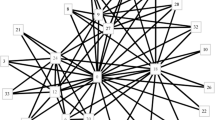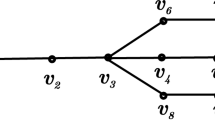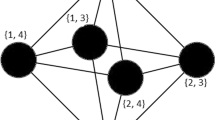Abstract
We present a new method to give upper bounds on the dimension of Hilbert cubes in certain sets. As a special case we improve Hegyvári and Sárközy’s upper bound O((logN)1/3) for the maximal dimension of a Hilbert cube in the set of squares in [1,N] to O((log logN)2).
Similar content being viewed by others
References
T. C. Brown, P. Erdős and A. R. Freedman, Quasi-progressions and descending waves, Journal of Combinatorial Theory. Series A 53 (1990), 81–95.
J. Cilleruelo and A. Granville, Lattice points on circles, squares in arithmetic progressions, and sumsets of squares, in Additive Combinatorics, CRM Proceedings & Lecture Notes, American Mathematical Society, Providence, RI, Vol. 43, 2007, pp. 241–262.
P. Csikvári, Subset sums avoiding quadratic nonresidues, Acta Arithmetica 135 (2008), 91–98.
H. Darmon and L. Merel, Winding quotients and some variants of Fermat’s last theorem, Journal für die Reine und Angewandte Mathematik 490 (1997), 81–100.
L. E. Dickson, History of the Theory of Numbers, Vol. II: Diophantine Analysis, reprint, Chelsea Publishing Co., New York, 1966.
C. Elsholtz, Hilbert cubes in the set of primes, talk at the workshop “Elementary and Analytic Number Theory”, Mathematisches Forschungsinstitut Oberwolfach, Report no. 12/2003. http://old.mfo.de/programme/schedule/2003/11/Report12_2003.pdf
W. T. Gowers, A new proof of Szemerédi’s theorem, Geometric and Functional Analysis 11 (2001), 465–588.
R. L. Graham, B. Rothschild and J. Spencer, Ramsey Theory, Wiley Interscience, New York, 1980.
K. Gyarmati, On a problem of Diophantus, Acta Arithmetica 97 (2001), 53–65.
N. Hegyvári and A. Sárközy, On Hilbert cubes in certain sets, The Ramanujan Journal 3 (1999), 303–314.
D. Hilbert, Ueber die Irreducibilität ganzer rationaler Functionen mit ganzzahligen Coefficienten, Journal für die Reine und Angewandte Mathematik 110 (1892), 104–129.
J. Solymosi, Elementary Additive Combinatorics, in Additive Combinatorics, CRMProceedings & Lecture Notes, American Mathematical Society, Providence, RI, Vol. 43, 2007, pp. 29–38.
E. Szemerédi, On sets of integers containing no four elements in arithmetic progression, Acta Mathematica Academiae Scientiarum Hungaricae 20 (1969), 89–104.
A. Wood, Subset sum “cubes” and the complexity of primality testing, Theoretical Computer Science 322 (2004), 203–219.
Author information
Authors and Affiliations
Corresponding author
Rights and permissions
About this article
Cite this article
Dietmann, R., Elsholtz, C. Hilbert cubes in progression-free sets and in the set of squares. Isr. J. Math. 192, 59–66 (2012). https://doi.org/10.1007/s11856-012-0047-7
Received:
Revised:
Published:
Issue Date:
DOI: https://doi.org/10.1007/s11856-012-0047-7




